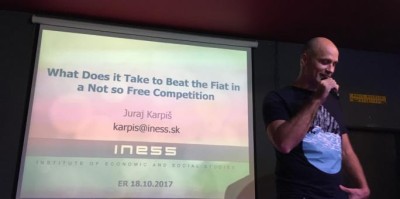In 2017, INESS launched a series of informal economic discussions called Ekonomické reči (Econtalks). Seven events were organized so far and more than 420 guests altogether visited the evening forum.
First Econtalks were held by Radovan Ďurana in March. The topic was dedicated to wages and named “When will Slovaks be rich?” More than 70 participants gathered in the audience, many of them students, members of trade unions, and other guests interested in this topic. Ďurana explained how wages are constituted, compared Slovakia´s wage levels with other countries and emphasized that wealth is not the same as GDP.
Second Econtalks were organized a month later. The topic was the sharing economy and an introductory speech was delivered by Robert Chovanculiak. He divided his speech in two parts, in which he first spoke about the phenomenon of the sharing economy in general and in the second part he talked about regulation issues regarding these services. A lively debate started; in the audience were also participants from regular taxi businesses, who saw UBER and similar services as unfair competitors. More than 60 people gathered at this evening debate.
In May, the third session of Econtalks was held by Juraj Karpiš. He talked about the last financial crisis, specifically, how the monetary policy of the European central bank was involved in the debt crisis and deepened the problems of the Eurozone. He also talked about the effort to reduce cash payments by European politicians and the possible threats of such a policy. Karpiš gave a few examples from the world where the limitation of holding cash under the veil of security measures has caused serious problems. After the official part of the event, the discussion continued in smaller groups.
Basic income is a hot topic discussed in many countries. It is also referred to as a solution to the increasing fear of automation. Martin Vlachynský held Econtalks No. 4 with more than 50 participants. At the beginning, the speaker presented some basic information about robotics, its historical origins, and concerns about its boom. He pointed out the fact that robotics mainly brings automation of tasks, not automation of occupations. Later, he followed up with the idea of the basic income that is perceived as a part of the automation trend solution. Vlachynský has also mentioned that some supporting arguments come from right-wing economists. Basic income is said to be a cheaper alternative to complex social security programs. At the same time, however, he mentioned the problematic areas of this system (mainly political and financial unsustainability).
When the Econtalks came back after the summer break in September, Robert Chovanculiak opened the event by presenting several examples of populist promises across the political spectrum. He pointed out the economic nonsense of some political measures and the fact that they are still strongly supported by voters. Chovanculiak explained the difference in behavior of a citizen in the role of a consumer and a voter. After the prologue, a lively discussion with the audience followed, and later continued in smaller circles even after the official ending of the event.
 How to compete with the euro? – this was the main topic of the 6th Econtalks. Juraj Karpiš from INESS talked about how significantly Bitcoin had risen and how attempts to curb cash payments under various pretexts strengthened mistrust in state money. Karpiš has quoted several examples where unstable currencies or the abolition of banknotes led to crises or greater use of cryptocurrencies. Finally, he defined the assumptions of a “successful” cryptocurrency, which would have the chance to replace state money in many areas. The event was attended by more than 90 participants, who had the opportunity to directly ask questions after the lecture.
How to compete with the euro? – this was the main topic of the 6th Econtalks. Juraj Karpiš from INESS talked about how significantly Bitcoin had risen and how attempts to curb cash payments under various pretexts strengthened mistrust in state money. Karpiš has quoted several examples where unstable currencies or the abolition of banknotes led to crises or greater use of cryptocurrencies. Finally, he defined the assumptions of a “successful” cryptocurrency, which would have the chance to replace state money in many areas. The event was attended by more than 90 participants, who had the opportunity to directly ask questions after the lecture.
7th Econtalks were dedicated to intellectual property rights and were led by Richard Ďurana, director of INESS. In the introduction, he defined patents, their development, and continued by naming the views of various economists on the contribution of patents to science and research. He pointed out the negative impact of the so-called patent wars, in which companies are more likely to invest in winning court cases than to bring forth new innovations. Another negative phenomenon resulting from patent protection constitute “patent trolls”. These are the patent holders who are patenting ideas just for rent-seeking purposes. Moreover, it is often difficult to determine who should be the patent holder. Finally, Ďurana summed up all the problems associated with patent protection and outlined four possible solutions.
In 2018, INESS will continue with another series of the evening discussions.



